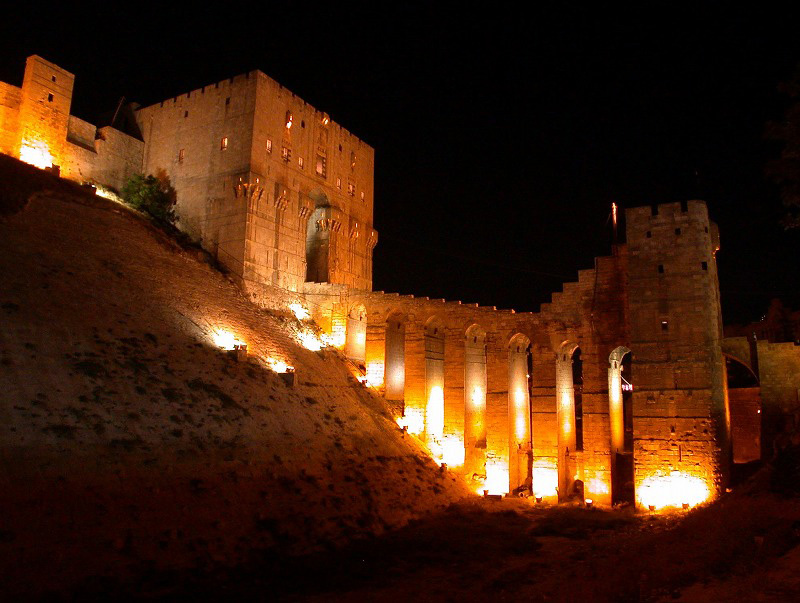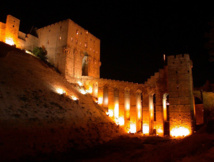"A powerful explosion was heard after midnight Saturday. It was caused by the blowing up of a tunnel in the Old City near the Aleppo Citadel," the Observatory said.
"The blast caused the collapse of part of the wall of the citadel," Observatory chief Rami Abdel Rahman said.
The Observatory said rebels dug the tunnel "but it was the regime which blew it up to prevent them from reaching an army position".
Abdel Rahman said the explosion was followed by clashes between rebels and government forces who are battling for control of the northern city.
SANA said "terrorists" blew up the tunnel, damaging the historic citadel.
The Syrian government and its media describe as "terrorists" the various armed groups who have been battling to oust President Bashar al-Assad's regime since 2011.
Rebels in Aleppo, Syria's second largest city and pre-war commercial hub, have often set off explosions in tunnels dug under military targets before launching attacks on them.
In March, rebels including Al-Qaeda's Syrian affiliate Al-Nusra Front, attacked a regime-held intelligence base in Aleppo by first detonating a tunnel bomb and then battling government forces.
For the past three years, Aleppo city has been divided between the government-held western sector and the rebel-held east.
Government forces are deployed in parts of the Old City as well as inside the citadel.
The rebels launched a major offensive in the first week of July to try to take territory on the western outskirts of the city.
The Aleppo Citadel, which contains the remains of mosques, a palace and bath buildings, is one of several sites in Syria on UNESCO's world heritage list.
One of the most famous is the ancient central city of Palmyra, which was seized by the jihadist Islamic State (IS) group on May 21.
Syria's conflict began with anti-government protests in March 2011.
It has killed more than 230,000 people, turned more than four million Syrians into refugees, devastated the country's infrastructure and economy and inflicted damage in many heritage sites.
Elsewhere, 11 IS members were killed in US-led air strikes on the northern city of Raqa, which the group has declared as its capital, the Observatory said.
The US-led coalition, in a statement, said it carried out six air strikes near Raqa on Saturday and eight others near Hasakeh, a northeastern city which IS has been trying to seize for more than a month.
The statement said Syrian regime aircraft had also targeted Raqa in raids that "were not coordinated with the coalition".
It said there have been more than 5,200 coalition strikes against IS in both Syria and Iraq since its campaign began in September.
-------------------------------------------------------------------------------------------------------------------------------------
"The blast caused the collapse of part of the wall of the citadel," Observatory chief Rami Abdel Rahman said.
The Observatory said rebels dug the tunnel "but it was the regime which blew it up to prevent them from reaching an army position".
Abdel Rahman said the explosion was followed by clashes between rebels and government forces who are battling for control of the northern city.
SANA said "terrorists" blew up the tunnel, damaging the historic citadel.
The Syrian government and its media describe as "terrorists" the various armed groups who have been battling to oust President Bashar al-Assad's regime since 2011.
Rebels in Aleppo, Syria's second largest city and pre-war commercial hub, have often set off explosions in tunnels dug under military targets before launching attacks on them.
In March, rebels including Al-Qaeda's Syrian affiliate Al-Nusra Front, attacked a regime-held intelligence base in Aleppo by first detonating a tunnel bomb and then battling government forces.
For the past three years, Aleppo city has been divided between the government-held western sector and the rebel-held east.
Government forces are deployed in parts of the Old City as well as inside the citadel.
The rebels launched a major offensive in the first week of July to try to take territory on the western outskirts of the city.
The Aleppo Citadel, which contains the remains of mosques, a palace and bath buildings, is one of several sites in Syria on UNESCO's world heritage list.
One of the most famous is the ancient central city of Palmyra, which was seized by the jihadist Islamic State (IS) group on May 21.
Syria's conflict began with anti-government protests in March 2011.
It has killed more than 230,000 people, turned more than four million Syrians into refugees, devastated the country's infrastructure and economy and inflicted damage in many heritage sites.
Elsewhere, 11 IS members were killed in US-led air strikes on the northern city of Raqa, which the group has declared as its capital, the Observatory said.
The US-led coalition, in a statement, said it carried out six air strikes near Raqa on Saturday and eight others near Hasakeh, a northeastern city which IS has been trying to seize for more than a month.
The statement said Syrian regime aircraft had also targeted Raqa in raids that "were not coordinated with the coalition".
It said there have been more than 5,200 coalition strikes against IS in both Syria and Iraq since its campaign began in September.
-------------------------------------------------------------------------------------------------------------------------------------









 Home
Home Politics
Politics











